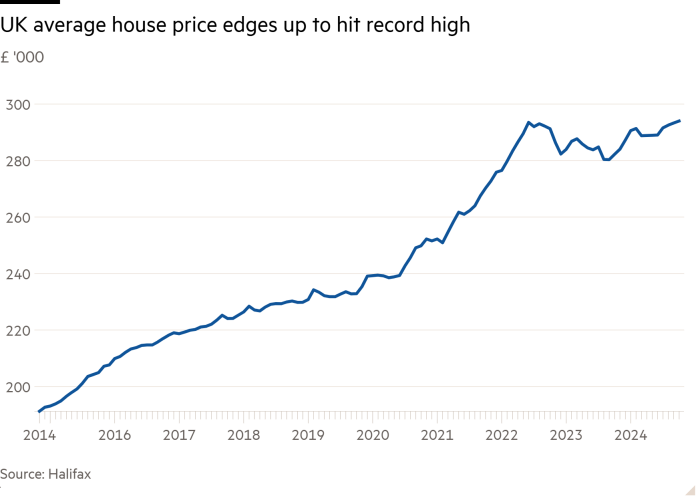Stay informed with free updates
Simply sign up to the UK house prices myFT Digest — delivered directly to your inbox.
The average UK house price edged up to hit a record high in October, according to the lender Halifax, even as growth slowed ahead of last week’s Budget.
A typical property now costs £293,999, surpassing a previous peak set in June 2022 of £293,507, when prices were boosted by the pandemic-era “race for space” and record low interest rates.
House prices increased by 0.2 per cent month on month, a slower pace than in the previous months, but a fourth consecutive monthly increase, new data showed on Thursday.
Amanda Bryden, head of mortgages at Halifax, said: “That house prices have reached these heights again in the current economic climate may come as a surprise to many.”
She explained that market activity had been improving on the back of the average mortgage rates dropping steadily since the spring coupled with continued income growth.
House prices were up 3.9 per cent from October last year, which marks a slowdown from the 4.6 per cent increase registered in September. The figure was also lower than the 4.1 per cent rise expected by economists polled by LSEG.
Last week, the lender Nationwide also reported slower house price growth in October.

This latest data “shows how Budget uncertainty eased the year-on-year price growth, as buyers and sellers braced for potential changes that could derail their plans”, said Holly Tomlinson, financial planner at the wealth management Quilter.
The Budget has also eased expectations for how fast the Bank of England will cut interest rates as higher spending and borrowing boosted short-term economic growth and inflation forecast.
Markets still expect the BoE to announce a quarter-point cut in interest rates to 4.75 per cent on Thursday.
Alex Kerr, economist at Capital Economics, said rises in interest swap rates — derivative products that track interest rate expectations on which mortgage rates are based — especially since last week’s Budget, “suggest there is scope for mortgage rates to rebound and provide less support over the next few months”.
However, Kerr said he expected that further ahead, mortgage rates would eventually fall and annual house price growth would accelerate from about 3 per cent in the fourth quarter this year to an above-consensus 5 per cent in the fourth quarter in 2025.
Halifax reported that Northern Ireland registered the strongest property price growth of any nation or region in the UK, rising 10.2 per cent on an annual basis in October.
London continued to have the most expensive property prices in the UK, now averaging £543,308, up 3.5 per cent compared with last year.










